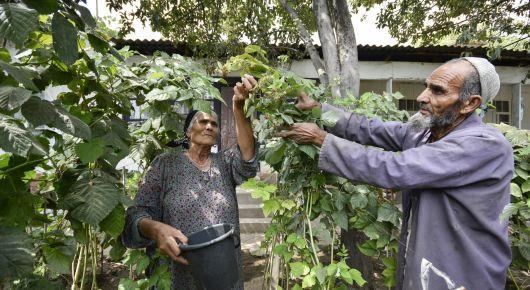Joint FAO, EBRD effort bears fruit in Georgia, Moldova, and Tajikistan

A two-day conference on efficient production and marketing of Georgian fruits and berries concludes today in Tbilisi.
Attracting producers from Georgia, the event focused on helping local growers take advantage of numerous investment and market opportunities, both locally and internationally, by sharing best practices in apple, pear and berry production, storage, freezing, handling and marketing.
The event is part of a larger FAO and the European Bank for Reconstruction and Development (EBRD) initiative aimed at supporting producers in various horticulture value chains, including berries, apples and pears, in Georgia, Moldova, Tajikistan and Uzbekistan.
It will be followed by a series of trade conferences that will bring together producers from all four countries with actors from Russia and Ukraine to discuss trade opportunities as well as study tours.
The conference programme included training sessions on modern production techniques, storage and marketing of apples and pears in Georgia, and berry production and processing. Today the participants will visit an apple orchard and modern cold storage facility in Georgia’s Mtskheta region, where they will also learn pruning methods and storage technologies.
Georgia has been a net importer of apples for many years but growing domestic production has helped satisfy local demand and apple producers are beginning to explore export markets. The natural choice is Russia, which is the only large importer of apples in the region.
“This is the first year in which Georgia has exported fresh apples due to supply finally exceeding local demand,” said FAO economist Andriy Yarmak. “However, the current mix of varieties of Georgian apple orchards makes it rather difficult to consider exports beyond Russia and even the Russian market is becoming more and more saturated. To find new markets Georgian farmers would have to explore new, internationally recognized varieties of apples, and invest in modern growing, storage and post-harvest handling technologies, which may take some time.”
As part of the broader project, FAO and the EBRD has conducted value chain analyses to identify investment opportunities along the numerous selected horticultural value chains in all four countries.
The conference in Tbilisi was supported by the European Union under its EU4Business initiative and Georgia’s Ministry of Environmental Protection and Agriculture.
Grapes’ growing potential
Last year, a series of events focused on the table grape industry through. Producers of Georgia, Moldova and Tajikistan learned that investing in new varieties and production techniques, improving quality and marketing could help them become more profitable and competitive.
Local producers are now putting that knowledge to good use. They are using improved techniques to protect their crops as well as drip irrigation for greater water efficiency. They also have a better understanding of the market potential for different grape varieties and the need to invest in proper cold storage, packaging and logistics.
13 March 2019, Tbilisi, Georgia
